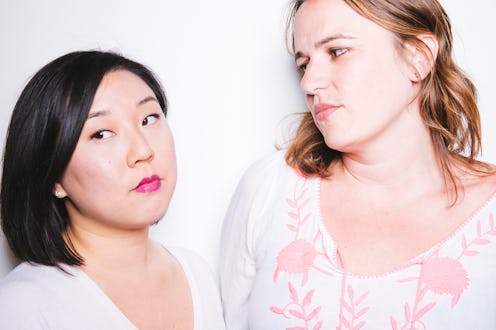Life
5 Things We Need To Stop Calling Women

Despite what you may have thought as a kid, sticks, stones, and words can hurt. Language shapes the way we interact with each other, and in the long run, everyday phrases wield a huge influence. That's why there are some things we need to stop calling women — why the heck are we still referring to women as "girls" in 2016?
There's a clear divide in the language we use to talk about men and women, and in totally unsurprising news, it's usually women who get the short end of the stick. Just look at media coverage of the 2016 election. Even before Donald Trump's recent campaign meltdown led to increasingly personal attacks on Hillary Clinton, the Democratic presidential nominee was characterized in ways that her male opponents weren't. Her voice was called "sHer voice was called "shrill" and "grating," and when she raised her voice while campaigning, she was widely mocked.
And it's not just public figures who are discussed in sexist terms; some of the phrases in our everyday vocabulary are incredibly gendered when you stop to consider them. With that in mind, here are five words that we should have stopped calling women a long time ago.
"Crazy"
Let's begin with one of the worst offenders: Crazy. The word is bandied about with alarming regularity, especially in regards to romance, but it's almost exclusively used to refer to women. A man might be a creepy stalker, but his sanity is rarely questioned in the way that a woman's would be. On an individual level, it's a way to gaslight someone; when you call a woman "crazy," it automatically minimizes her actions in the past and present. It's also stigmatizing in terms of mental health.
In the larger scheme of things, it's a form of controlling women's behavior; we always have to be calm and avoid causing a scene. After all, you don't want to look crazy.
"Girls"
Think back on any time you've referred to a group of women, and in all likelihood, you've called them "girls" at some point. For some people, it's automatic, but when you stop and consider what you're saying, there are seriously patronizing connotations. A girl is a female child. Using it to refer to a grown woman infantilizes her and totally fails to respect her maturity. As Gina M. Florio writes for Bustle, calling a woman a girl "implies that she needs to be looked after or taken care of, like a silly tween who needs guidance from her camp counselor."
"Cougar"
"Cougar" may have had its heyday in 2009, but it still comes up in conversation whenever the subject is women who date younger men. Some people mean it as a compliment, in the "you go, girl" sense (there's that other word again, too), but drawing attention to these women just perpetuates the idea that they're abnormal.
It's telling that there's no male equivalent; men who date younger women are just men. In fact, they're often the norm, which may partly explain why people react so strongly to so-called "cougars" — one Urban Dictionary entry refers to a cougar as an "absolutely sad and bloated old horn-meister"— when they don't bat an eyelash at men who date women half their age. As long as they're capable of consent, the age of someone's partner is their own business, and singling out women as cougars does nothing but stigmatize older women's sexuality.
"Tomboys"
Any girl whose idea of a good time doesn't fit the stereotype (in other words, if you were less than stoked about dolls or the color pink) winds up being called a tomboy. Oddly enough, the term has pretty questionable origins: For centuries, it was used to refer to adult women who didn't conform to societal standards. Today, a tomboy is a girl who enjoys traditionally masculine activities, but as JR Thorpe points out for Bustle, this marks out tomboys as different. "Here is what a normal girl is like, and here is a tomboy. ... That separation does nobody any good, even if it's meant to be positive," she writes.
"B*tch"
"B*tch" is a touchy topic among feminists. Some say it can be reclaimed and used to empower women, but others point out that it ultimately has negative connotations. It comes down to this: Context is hugely important, and as Laci Green points out in a video on the subject, "b*tch" usually enters the conversation when women are doing something "unfeminine," like being outspoken or aggressive. So use it if you want to, but be careful of the unspoken message behind the insult.
Images: Andrew Zaeh for Bustle; Giphy (5)